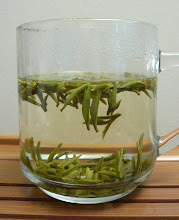Wu Yu Tai is a teashop in Beijing with more than 170 years of history (their English website has no valuable information, but the little painting is cute). It is THE teashop where my parents go tea shopping in all these decades. Before Wu Yu Tai's rapid expansion, it was our neighborhood teashop. Nowadays with many Wu Yu Tai teashops all over Beijing, my parents still go to the small, quiet neighborhood shop. Unlike my parents, since long time ago, I have been buying most of my tea elsewhere. But in my eyes Wu Yu Tai is still the good old teashop that always has great tea.
In fact, today's Wu Yu Tai is no longer the traditional business as it was established. In the past decades, it expanded rapidly through enfranchisement. I've never liked the idea of enfranchisement in tea business. However, in business sense, it has been a success for Wu Yu Tai. The other day, I was thinking, what makes people like my parents and I love Wu Yu Tai throughout all these years, in spite of all the changes in the society and in the teashop? I believe it's because of the traditions that have been retained in this business. These traditions include:
1. It's a tea business that knows how to make tea. A hundred years ago, Wu Yu Tai purchased tea leaves directly from the farmers and had tea processed by its own artisan workers. The company owned jasmine plantations in Fujian and transported blooming jasmine plants for thousands of miles to Beijing to make jasmine green tea. They are still doing all these today (except that most jasmine tea is made on site in Fujian where the jasmine is grown), which is actually not the business mode of most other large tea companies in China. A friend of mine, a Tie Guan Yin expert once commented that one of the largest problems of many large Chinese tea companies is they don't care about growing tea, processing tea or carrying out tea research; instead, they only care for buying finished tea products from farmers and selling them for much higher prices. They believe in packaging, marketing and advertising, but not the basic work. In fact, some of them are financially successful. But I doubt many of them can last over 100 years.
2. It holds strict standards. Many modern tea businesses seemingly hold strict standards, with their products bearing all kinds of grand titles. But nowadays tea drinkers constantly question, are there standards at all for tea products? Before 1980s, when all Chinese tea businesses were state-owned, there was a full set of National Standards on various types of tea and they were strictly followed. With the privatization of tea businesses, national standards are no longer commonly applied on tea products, and basically a company can call whatever tea Grade 1 or Superior Grade without liability. In the old days, it was well known that Wu Yu Tai held stricter standards on their tea than the National Standards. Today, as far as I know, they still have high standards. Very often, a Grade 2 product of theirs is much better than a Grade 1 product from another large tea company.
3. It has signature products that are not affected by market trends. The teashop's inventory structure does change a lot with market needs. But veteran tea drinkers can always get what they've been enjoying for decades. When Taiwan High Moutain Oolong gets trendy, Wu Yu Tai carries it too. But meantime, they always have the nice, medium-oxidized Dong Ding. When 90% of tea drinkers in Beijing drink green style Tie Guan Yin, Wu Yu Tai sells it too. But they always have their honey-aroma traditional Tie Guan Yin. Trends come and trends go. Nowadays in Beijing, there are numerous places where you can buy tea, let it a lone the even more online shopping options. But there are only few old businesses like Wu Yu Tai where people can get the same specific teas that they've enjoyed over decades.
Wu Yu Tai is changing fast. It has started enfranchisement. It sells more and more types of teas (sometimes they seem too many to me). It sells more and more super expensive products. It even sells tea mooncake - I don't mind Haagen Dazs selling ice-cream mooncake, but I don't really like seeing a teashop selling tea mooncake. After all, Wu Yu Tai is a teashop in a fast-changing society. It surely loses some traditions in all these changes. And I don't know if someday it will change so much that I will stop loving it. But so far, it still remains a pleasant part of my tea life.
六堡茶道美学煮茶
3 years ago































2 comments:
Felt transported into another world while reading this post. The tea store you mentioned sounds so worth a visit! 170 years old; they're obviously doing a lot right. Customer care for example. It's wonderful, how they don't simply follow trends.
If you ever get the chance to post a picture, that would be great.
Wish we had such a tea shop here!
I never thought of taking a photo but yeah next time I would take some photos of the little shop we go. Nowadays they have dozens of chain stores in Northern China. But I usually would still go to the original small storefront.
I started out to write about a tea of theirs but ended up talking about why I like this store! I will write about that tea later. It's a tea that's totally not trendy. I am both surprised and glad that they still have it!
Post a Comment